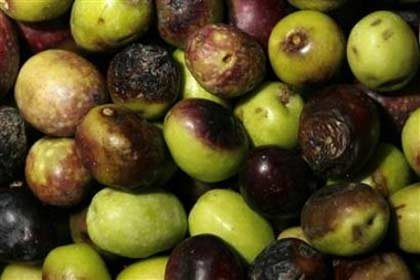Olive oil may hinder cancer process
(Reuters)Updated: 2006-12-20 17:02
New York - People who use plenty of olive oil in their diets may be helping to prevent damage to body cells that can eventually lead to cancer, new research suggests.
In a study of 182 European men, researchers found evidence that olive oil can reduce oxidative damage to cells' genetic material, a process that can initiate cancer development.
They say the findings may help explain why rates of several cancers are higher in Northern Europe than in Southern Europe, where olive oil is a dietary staple.
They also support advice to replace saturated fats from foods like meat and butter with vegetable fats, particularly olive oil, said study co-author Dr. Henrik E. Poulsen, of Copenhagen University Hospital in Denmark.
He and his colleagues report the findings in The FASEB Journal, a publication of the Federation of American Societies for Experimental Biology.
The study included healthy men between the ages of 20 and 60 from five European countries. For two weeks, the men consumed a quarter cup of olive oil throughout each day. At the end of the study, they showed an average 13 percent reduction in a substance called 8oxodG, which is a marker of oxidative damage to cells' DNA.
Such damage occurs when byproducts of metabolism called reactive oxygen species overwhelm the body's antioxidant defenses. Olive oil contains a number of compounds, called phenols, believed to act as powerful antioxidants.
However, those compounds didn't seem to account for the drop in DNA oxidative damage, according to Poulsen's team. The men in the study used three different olive oils with varying levels of antioxidant phenols, and oxidative damage declined regardless of the phenol content.
Instead, the researchers suspect that the monounsaturated fats in olive oil are behind the effect.
The findings, they say, suggest that olive oil may be part of the reason that certain cancers, including breast, colon, ovarian and prostate cancers, are less common in Mediterranean countries than in Northern Europe.
At the beginning of the study, men from Northern Europe had higher levels of 8oxodG than those from Southern Europe. This is consistent, according to Poulsen's team, with the expected effects of the olive-oil-rich "Mediterranean diet."
However, Poulsen told Reuters Health, the diet is more than just olive oil. Ideally, it's also rich in fruits, vegetables, whole grains and fish.
Moreover, regardless of its benefits, he added, olive oil is no substitute for calorie control and regular exercise.
|
||
|
||
|
|

